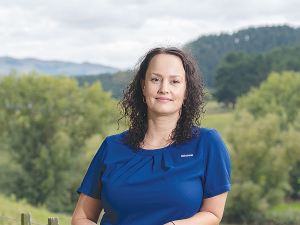Farmer confidence dips slightly, but positivity still dominates
Farmer confidence has taken a slight dip according to the final Rabobank rural confidence survey for the year.
 Emma Higgins, Rabobank says milk production from the main global export regions will expand only modestly in the coming months.
Emma Higgins, Rabobank says milk production from the main global export regions will expand only modestly in the coming months.
With just over two weeks left in the 2023-24 season, all eyes will be on Fonterra's opening milk price for the new season.
Lower milk output from key producing regions is expected to keep upward pressure on milk price in the coming months. But China's growing milk production could provide headwinds.
Rabobank and Westpac are forecasting an opening milk price of $8.40/kgMS for the new season. ASB is predicting $8.35/kgMS.
In its Q2 Global Dairy Quarterly report titled Lower equilibrium, Rabobank says milk production from the main global export regions will expand only modestly in quarter three before gaining some momentum towards the end of the year.
"Low profitability over the past 12 months has led to a decrease in dairy herds in key regions like the US and South America, while weather-related issues have also affected milk output in recent weeks, with diminished rains in New Zealand and excess rains in Europe," Rabobank senior agricultural analyst Emma Higgins says.
"And this subdued global milk supply growth should help underpin a continuation of the dairy market recovery and an improvement in milk prices for dairy producers in most regions around the world."
While this was the case, Higgins warned the recovery would not be smooth.
"Global demand recovery signals are mixed, and consumers' purchasing power remains under pressure," she says.
"Although unemployment remains close to record-low levels in most large markets, consumer sentiment is gloomier than anticipated. Inflation remains above target in most countries and high interest rates continue to put pressure on debts and consumer spending at a time when credit plays an important role after cumulative inflation in recent years."
Another potential headwind for dairy prices, according to Higgins is higher milk production in China.
"We have now revised our milk output in China for 2024 from two per cent to 3.2 per cent, reflecting higher-than-anticipated output due to the lagging effect from the last round of dairy expansions during 2019-2022," she says.
Considering these factors, Higgins says, the bank's view was that the current recovery in dairy market prices would now be slower than anticipated in its quarter one report.
"The jump in prices in late 2023 and early 2024 appears to have been more of a response to low prices and re-stocking than a sustained improvement in consumer demand in most regions," she said.
"China's reduced dependence on imports will also be a headwind for the global dairy market in the months ahead."
Higgins says the expectation Chinese milk production would grow at a quicker rate, was a particular challenge to Rabobank's milk price forecast for the upcoming New Zealand dairy season.
"Chinese production figures are especially significant for New Zealand's dairy sector given their influence on Chinese import requirements and the fact more than 30 per cent of this country's dairy exports head to the Chinese market," she says.
"And we do see this increase in Chinese milk output as a downside risk factor to the New Zealand farmgate milk price."
The report says a New Zealand milk price of $8.40/kgMS would be broadly profitable at a national level, but budgetary pressures are likely to remain for local producers.
"Should milk prices for the 24/25 season stay near this level, cost will still remain front."
The World Wide Sires National All Day Breeds Best Youth Camp Best All Rounder plaudit has become family affair, with 2026 Paramount Cup winner Holly Williams following in her sister Zara's footsteps.
DairyNZ is giving New Zealand farmers a unique opportunity to gain hands-on governance and leadership experience within the dairy sector.
Herd improvement company LIC has posted a 5.2% lift in half-year revenue, thanks to increasing demand for genetics.
According to the latest Fresh Produce Trend Report from United Fresh, 2026 will be a year where fruit and vegetables are shaped by cost pressures, rapid digital adoption, and a renewed focus on wellbeing at home.
The Roar is a highlight of the game hunting calendar in New Zealand, with thousands of hunters set to head for the hills to hunt male stags during March and April.
OPINION: The past few weeks have been tough on farms across the North Island: floods and storms have caused damage and disruption to families and businesses.
OPINION: Fonterra may be on the verge of selling its consumer business in New Zealand, but the co-operative is not…
OPINION: What does the birth rate in China have to do with stock trading? Just ask a2 Milk Company.